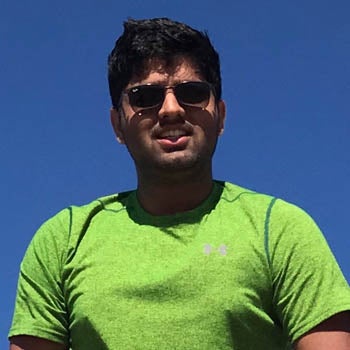Major: Biochemistry and Cell Biology
Minor: Medical Humanities
Research Advisor: James Welsh, MD Anderson Cancer Center
“I am simply amazed by the power of the immune system,” said junior biochemistry and cell biology major and medical humanities minor Rishab Ramapriyan. He became interested in immunotherapy, or using a person’s own immune system to fight cancer, after reading a Scientific American article as a high school student. When he came to Rice, he was determined to find an opportunity to conduct research in an immunotherapy research lab. He found that opportunity with Dr. James Welsh at MD Anderson Cancer Center, a leading institution in cancer immunology research.
“Immunotherapy—which includes various strategies to enhance anti-tumor immune effects—has made a profound impact on cancer treatment, but only a subset of patients respond,” explained Rishab. He has been exploring how tumors develop resistance to immunotherapy and identifying strategies that researchers can use to overcome resistance. Specifically, he is investigating metabolic changes in tumors that show resistance to immunotherapy, mainly by evolving mechanisms to prevent the infiltration of immune cells into the tumor.
Through his research at MD Anderson, he has truly learned what it means to be a research scientist. “I had to immerse myself in the literature, ask questions, develop hypotheses, learn new techniques and communicate findings on my own. There were many setbacks and periods of no progress, but I found myself inspired by the work ethic of my mentors and those around me,” Rishab said.
His persistence and hard work have paid off, however. “Not only have I had the opportunity to engage in cutting-edge projects to enhance the efficacy of cancer immunotherapies, but I also have been able to collaborate and network with pioneers of the field,” said Rishab. “I have been infected with a burning passion for cancer immunology. After seeing my own work translated to clinical trials at MD Anderson, a new sense of responsibility has unfolded in me and galvanized my determination to keep pursuing this research.”
With funding from Rice’s Wagoner Foreign Study Scholarship, Rishab was able to gain additional research experience working with Professor Xin Lu at the Ludwig Institute for Cancer Research in Oxford, UK. There, he spent three months studying the mechanisms of Epstein-Barr Virus (EBV) in EBV-associated epithelial cancers. “Many of the techniques that I employed in this project were already in my technical repertoire, due to my past research experience at MD Anderson,” Rishab said. “I found the project very rewarding as I learned about new angles in treating cancer, especially when it tries to evade the immune system.”
Rishab’s research experiences tie together the things he likes best about the biochemistry and cell biology major: the connections between biological sciences, physics and chemistry and a strong emphasis on research and inquiry-based learning. “My major really set me up well to excel in the research setting,” he said.
In addition to working in the research lab, Rishab is also a tour guide, vice president of Will Rice College, and recently became the Editor-in-Chief of the Rice Thresher, the official undergraduate newspaper at Rice—an activity that has a unique connection to his love of research.
“I’ve been involved with the Rice Thresher since the start of my time at Rice. I love working with a passionate and dedicated staff to put out a great product each week,” he said. “I have allowed my love for storytelling to permeate into all of my endeavors beyond journalism. In my immunotherapy research at MD Anderson, I approach every new experiment with the goal of adding to a story of discovery and hope. Writing and publishing about these intricacies and their larger clinical contexts have allowed me to channel my journalistic imagination into a scientific fervor.” In fact, Rishab has already authored or co-authored more than 10 papers.
After he completes his undergraduate degree, Rishab plans to pursue a postgraduate international research fellowship and eventually attend medical school, and the opportunities and supportive community he has found at Rice have helped to prepare him for future success. “Rice allows students to pursue learning both inside and outside the classroom to a significant extent,” he said. “I’ve been able to pursue my intellectual interests through classes, labs and research opportunities. And I’ve had so many wonderful interactions with faculty that have allowed me to grow both personally and professionally on a continual basis.”

